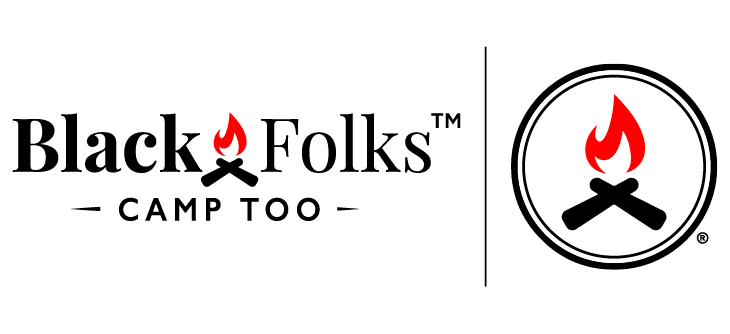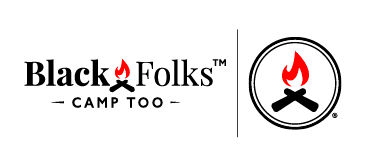Black Folks Camp Too aims to get Black people hiking, camping, into the outdoor economy
This article was written by Karen Chavez, and first published by Citizen-Times.com
PISGAH NATIONAL FOREST – Tabatha Rucker, 40, hadn’t been in her tent for long before she swore she heard a bear. The finance coordinator with the YMCA of Greater Charlotte had never spent a night outdoors in her life. When she found herself this summer zipped up in a tent, deep in the dark woods, with a warning from her trail guide not to even keep an almond in her tent or bears would smell it, she questioned the sanity of her decision. “I’m not fearful about doing a lot of things, but I am fearful of sleeping outdoors. I don’t think we should be in the wildlife domain,” Rucker said. She couldn’t sleep. It was too dark, too quiet, there was no internet service. And was that noise a bear? She panicked, felt like she couldn’t breathe, unzipped her tent, jumped out and yelled “Earl?” That was Earl B. Hunter Jr., a friend she had known for decades, who just launched a business called Black Folks Camp Too, and encouraged Rucker to try camping. “He answered me, ‘Are you OK?’ I said, ‘Yes. I just wanted to make sure you were there,’” Rucker said. “I felt reassured and fell off back to sleep. That overnight experience really helped me to this day to release control and live in moments that I can’t control,” she said. While Rucker never did encounter a bear on the two-day backpacking trip, the scenario is one of the many reasons Black folk don’t camp. Hunter aims to change that by removing the fear many Black folks have about camping, adding knowledge, and inviting them into the woods.
What is Black Folks Camp Too?
Hunter looks and feels right at home hiking a hardwood forest trail, with a bounce and an ease in his boots as he crosses streams on split-log bridges and basks in the splash and spray of a waterfall. He might also be one of the only Black people you’ll see hiking or camping in the Western North Carolina mountains this year. But Hunter is aiming to shake up that status quo by trading in his former Italian-suit, Gucci-shoes executive attire to his T-shirts and trucker hats emblazoned with a campfire logo and “Black Folks Camp Too,” the business he claims will “change the world.” While he says Black folks do camp, it’s a fact that those who hike and camp in parks and forests are overwhelmingly white. But what is often not known are the reasons why, and what to do to correct another racial disparity in this country, which led Hunter to launch Black Folks Camp Too last year. The company is an LLC aimed at connecting Black people to the excitement and health benefits of activities like camping, hiking, backpacking and RVing, while training those in the RV and outdoor industry how to market to the virtually untapped Black consumer market. It was an idea sparked three years ago by Hunter’s now 10-year-old son, Dillon. Hunter, 44, former vice president of sales for Brevard-based SylvanSport, a manufacturer of RV trailers, was off on one of his many business trips to sell campers. Dillon asked if he could go “on vacation” with his father. “To me it wasn’t vacation, it was work,” Earl Hunter said. But he agreed, and off he and Dillon went on the ultimate father-son bonding adventure, covering 14,000 miles to visit 49 campgrounds in 20 states and even some in Canada. In their three-month road trip, they met exactly one other Black family, Hunter said. Since that time, Hunter, who lives in WNC with his wife and kids, including a 7-year-old daughter named Fuzzy, has been laser-focused on a mission to bring Black folks to the outdoors. Even though Hunter launched his business before the death of George Floyd – a Black man who died under the knee of a white Minneapolis police officer – sparked fury and protests against police brutality across the country, and before the coronavirus pandemic exposed the inequality in health care toward people of color, he said this past year’s events demonstrate the need for the healing that happens around a campfire. “We’re not a company that was created just to get Black folks to camp with Black folks. We were created to get Black folks to camp with anyone and everyone,” Hunter said on a recent hiking trip in Pisgah National Forest. “We believe the campfire in our logo is the portal to amazing conversations. It doesn’t matter your age, your gender, your race. Everyone has something to say and once we get around that campfire, whether literal or virtual, we’ll have more time, more space, more air, to have conversation about some of the things we have going on socially,” he said. “We have to get to the root of the issue before we can get to the surface. And to do that, you have to have conversation.”
Generational fear of the outdoors
Hunter was not raised with camping in his blood. Instead, Hunter grew up in what he describes as the all-Black public housing projects of urban Columbia, South Carolina. Other than fishing and hunting, spending time in the woods – especially backpacking and overnight camping trips – were not only not the norm of his childhood, those activities were strongly discouraged, he said. “There’s a lot of generational fear in regards to Black folks in the outdoors. And that’s one reason why we don’t see many of us on these trails. Because the outdoors, particularly the forest and particularly in the South, hasn’t been really kind to Black folks,” Hunter said. “It was a place where a lot of heinous things happened.” Fear is one of three reasons Hunter said he believes Black folks shy away from forests. The others are lack of knowledge, and not being invited to the party. “When you’re fearful of something, you don’t have any knowledge about it and you stay away from it. So we went from thinking that camping was this scary place with tents, but it’s evolved,” Hunter said. “It’s gone from tent camping to pop-up campers to travel trailers to motor homes to cabins in the woods, and it’s passed us by. The industry never really dug down deep to understand the history of why we don’t camp,” he said. “And then the third thing is, the industry never invited us. So, if you’re scared of something and you have no knowledge, and nobody invited you, why would you go?” Hunter attended Georgia Military College and Appalachian State University in Boone on full athletic scholarships. He graduated from ASU with a minor in political science and a major in interpersonal communication. He went on to a successful career in sales and sourcing products around the world. But he never went camping until taking the job at SylvanSport.
Outdoor industry is missing out on sales
Whether in hiking boots and shorts, or in a suit on a stage, Hunter is a high-energy powerhouse – even known to break into song – with the ability to make everyone in his presence feel empowered by positivity, as well as the power of money-making opportunities. In October 2019, Hunter served as master of ceremonies at the second annual Outdoor Economy Conference, “Building an Outdoor Economy,” a three-day, sold-out affair at Asheville’s Crowne Plaza Resort that drew 500 attendees from 15 states. His job was to keep the audience engaged and excited about the workshops and panels promoting the outdoors industry, a $28 billion business in North Carolina, according to the latest Outdoor Industry Association’s economic report. Nationally, outdoor recreation is a “powerful economic engine,” according to the report, producing more in annual consumer spending — $887 billion — than pharmaceuticals ($466 billion) and gasoline and fuels ($304 billion). Hunter said he looked out at the audience of outdoor industry executives, workforce and economic development experts, parks and recreation leaders, public land managers, and Congressional representatives. It was a sea of white faces. “What shocked me at the outdoor economy conference is this is an $887 billion industry. The key word is economy. When you think about economy, you think about dollars. So why would you not want to go get all the dollars? Don’t you want everyone’s money?” he said. Hunter launched Black Folks Camp Too from the stage that day. He had already left SylvanSport the previous summer to funnel his enormous energy into his new business. He already knew through his own experience that Black campers were a rarity. But studies confirm the numbers. The 2019 OIA Participation Report shows that Black Americans hike and camp less than any other race. Only 5.9% of Black people said that they camped or backpacked as opposed to 16.3% of white survey respondents. And only 5.5% of Black Americans hiked vs. 20% of white people, 21.2% of Asian people, and 14.6% of Hispanics. Hunter called on the Outdoor Economy Conference attendees to diversify for the next conference, which this year will take place virtually every Thursday in October. It includes one day devoted to diversity, “Growth Through Diversity, Equity and Inclusion,” noon-4 p.m. Oct. 8. The keynote speaker will be Teresa Baker, founder of the Outdoor CEO Diversity Pledge. Hunter will also speak at the conference. When he says he’s going to change the world, doubters better check themselves. Hunter took SylvanSport from a $1 million to a $17.5 million business in four years, he said. He puts his business savvy to work through content on the Black Folks Camp Too website, which includes everything from camping tips for beginners to how to buy a tent or trailer or RV, to gear reviews, to tips on cooking on a campfire, to inspirational stories encouraging Black people to get outdoors, and links to his YouTube channel. Hunter also works with the industry to improve its marketing to Black folks and increase its sales and ROI, or return on investment. He said Black Folks Camp Too is working with many businesses in the RV industry, outdoor retail and campgrounds that share a like-mindedness but don’t have the right staffing or training in place. “Where a lot of companies go wrong, is they put out messages about marketing that they think Black folks really want to see or to do,” Hunter said. “But they tend to never have anyone on their staff that looks like me, anyone to check that messaging and say, ‘Oh, you shouldn’t do that. You shouldn’t say that.’” David Ledford, owner and president since 1983 of Bob Ledford’s Adventure Motorhomes, in Greer, South Carolina, first met Hunter when he was with SylvanSport. “He has a very dynamic personality,” Ledford said. Hunter has helped the business by appearing in commercials, on the showroom floor and with marketing. “He’s a very passionate, upbeat, exciting guy and regardless of what he chooses to do, he’s going to bring enthusiasm to everybody he reaches or touches. So I’m just glad that he’s out there reaching to touch people with recreational vehicles,” Ledford said.
Campfires changing lives
While Hunter is swift to stop people on the trail and ask them in a friendly way why they think Black folks don’t camp and to tell them the meaning of the campfire logo on his cap, he’s also quick to tell people what Black Folks Camp Too is not. “We’re not a group or a club,” he said. But his staff of marketing pros will take camping gear for a spin, learn the tricks of the trade and get Black folks motivated. Hunter’s first backpacking trip was last year, a 15-mile trek through the remote Panthertown Valley with white folks he met at the Outdoor Economy Conference. He learned the weight of a backpack, the luxury of a good sleeping pad and the power of duct tape. This summer, he paid it forward when he and Steven Reinhold, proprietor of the Appalachian Adventure Co. and trail chef extraordinaire, took a group of first-time hikers on an overnight trek in Pisgah National Forest. Hunter enlisted some childhood friends as well as Rucker, 40, who lives in Fort Mill, South Carolina. Rucker had never been camping but knew Hunter from decades ago when he sang at her sister’s wedding, and she had heard his talks as a motivational speaker. The 10-mile round-trip trek in Pisgah was something Rucker said changed her life. “I was in a season in my life where I needed to be pushed to face some reality. And the camping trip that Earl put out there was a perfect opportunity for me to go way past my boundaries,” Rucker said. She said the hiking was a challenge, but she enjoyed the camaraderie of the others she just met, as well as the gourmet meals Reinhold prepared, including a dinner of fajitas, black beans and rice and a side of chips and salsa. Then the group rehashed the hike around the campfire and sang their favorite songs – Rucker’s was Aretha Franklin’s “You Made Me Love You,” but she also enjoyed “Tennessee Whiskey” and Ice Cube’s “Today was a Good Day.” Reinhold taught them about pitching camp and about keeping food properly stored away from bears. Rucker said after the trip, her parents gave her a fire pit for her backyard. She has enjoyed reliving the campfire memories with her children, her friends or just by herself. She is planning a camping trip with friends this year, perhaps in an RV “with more amenities,” like a shower.
Why should Black folks go camping?
Hunter said the reasons Black folks should camp are the reasons everyone should get outdoors – for health, the appreciation of nature and because it’s everyone’s right. According to a 2008 visitor use study in the Great Smoky Mountains National Park – the most visited park in the country – 97% of visitors each year are white, while only 2% were American Indian or Alaska Native, 1% Asian, 1% Black or African American and 2% identified as Latino or Hispanic, who can be of any race. A 2008 Blue Ridge Parkway study showed nearly identical results – 97% of visitors were white, 1% American Indian, 1% Black, 1% Asian and 2% Hispanic. A visitor-use study by the U.S. Forest Service in 2018 showed that of the nearly 6 million visitors to the national forests in North Carolina, 96% were white, 4.7% Hispanic, 1.5% Black/African American, 1.4% Asian and .8% were American Indian/Alaskan. The numbers show a lopsided use of public lands and outdoor activities. Black people make up 13% of the U.S. population and 22% of the North Carolina population. “Black folks have been paying for national forests for years. I believe it paid for this lifestyle for others for years. And we haven’t been taking advantage of it,” he said. “It’s the right thing to do. Everybody in the country pays for these national forests. Everybody should be going. ”He said while many Black people might know about Disney World, they don’t know about the state and national parks and forests in their own backyards, like Lake James and Mount Mitchell, the Blue Ridge Parkway and Pisgah National Forest, and that they’re free to use. Now more than ever, COVID is driving people outdoors, to de-stress, to exercise and to enjoy it in a relatively safe and inexpensive way, he said. “It’s healthy, mentally, physically and emotionally. The outdoors brings a sense of calmness and a sense of wow,” he said.Perhaps the biggest reason it’s important for Black folks to get outdoors is because of the legacy it will leave, Hunter said. “The more people that care about public lands, the better they will be. The more people who cherish and love the public lands, the more they will want to make sure that they’re protected,” Hunter said. “People need to understand, the outdoors is sacred. When I’m outdoors, I feel like I’m in touch with myself. I closed one of my biggest deals camping.” And for Rucker, one somewhat frightful night in the outdoors changed her life. “That camping trip hit a home run for me. I strongly encourage Black folks to camp, but to be open to have those conversations about why we don’t camp,” Rucker said. “Earl is doing a wonderful job raising positive awareness around the camping culture and having Black folks feel very comfortable in a setting that is not a first priority for vacation in our culture.”
Karen ç is an award-winning outdoors and environment reporter for the Asheville Citizen Times and USA TODAY Network. She is the author of “Best Hikes with Dogs: North Carolina,” and is a former National Park Service ranger.








